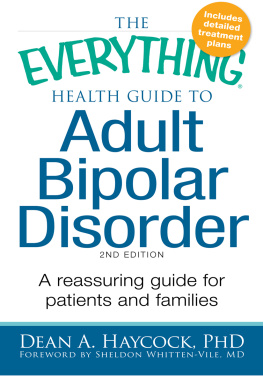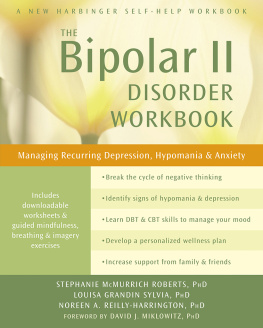William R. Marchand, MD, is a mindfulness teacher, board-certified psychiatrist and neuroscientist, clinical associate professor of psychiatry, and adjunct assistant professor of psychology at the University of Utah. Additionally, he is the Associate Chief of Mental Health and Chief of Psychiatry at the George. E. Wahlen Department of Veterans Affairs Medical Center. He has years of experience treating bipolar disorder, researching the neurobiology of mood and anxiety disorders, and teaching mindfulness. His personal mindfulness practice is in the Soto Zen tradition, in which he is an ordained monk. He lives in Salt Lake City, UT.
William Marchand brings together his knowledge and experience as a psychiatrist with his insight and wisdom as a mindfulness practitioner. The result is an informative guide, full of practical tools for managing bipolar disorder, enhancing well-being, and living a more fulfilled life.
Paul Thielking, MD, assistant professor of psychiatry at the University of Utah School of Medicine
Mindfulness for Bipolar Disorder integrates recent findings from clinical, scientific, and meditation communities to help one understand the reason for their struggles, describes the treatments currently available, and then honestly presents how adding mindfulness practice to ones life will reduce suffering associated with bipolar disorder.
Rev. Jim Daiko Bilskie, PhD, Soto Zen monk, veteran, and PhD in environmental physics
Finallya book written for real people, with an easy-to-follow plan of action. William Marchands compassionate wisdom brings to light a new way to manage bipolar disorder, and offers a step-by-step approach to using mindfulness, as well as numerous meditations. This book offers insightful wisdom from Marchands perspective as both a psychiatrist and mindfulness teacher.
Mary Beth Cooper, journalist, communications specialist, and avid supporter of mental health awareness
Mindfulness for Bipolar Disorder extends far beyond management of bipolar symptoms. This easy-to-read, well-written book is a valuable resource for all humans, whether living with bipolar disorder, another chronic illness, or life in general (which can be a chronic condition). The practice of mindfulness is a gift, available to all, that will have a powerful impact on your life.
Karen Dittrich, MD, discovered mindfulness and meditation after being diagnosed with multiple sclerosis twenty-two years ago
[Marchands] book is a breakthrough in the advancement of the treatment of bipolar disorder, as a more intractable condition. In this book, readers will find a combination of scientific knowledge and the techniques of meditation as practiced for centuries. As a highly regarded psychiatrist, Marchand is able to offer proven methods for the cessation of suffering. By doing so, he has shown not only his professional acumen, but also his compassionate heart and wisdom in the service of others.
Victor Perri, practicing Zen Buddhist and lawyer for over thirty years in areas including labor, employment, disability law, and civil rights
In Mindfulness for Bipolar Disorder, Marchand offers a unique flavor of mindfulness practice for a serious and difficult mental illness. It combines well-balanced, ancient, traditional techniques with modern empirical, practical, and repeatable wisdom from Western science and medicine. Mindfulness for Bipolar Disorder covers a remarkably broad range of symptoms of the illnessincluding the quite nuanced, such as noticing the difference between pleasure and happinesswith pragmatic tools and techniques for their management. Marchands style of writing is not only accessible and easy to understand but is also influenced by deep kindness and compassion for his patients. Readers can expect to have the sense that their condition is not a hopeless and untenable disorder, but rather a challenging set of symptoms that can be managed with relatively simple mindfulness-based practices.
Adam Shishin Lintz, husband, father, student of and practitioner in the Soto Zen tradition, software architect, and martial artist
Marchands caring professionalism comes through in spades in his insightful and compassionately written book, Mindfulness for Bipolar Disorder. With a clear understanding of the science behind both bipolar disorder and mindfulness practice, Marchand honors readers unique struggles, while encouraging hope for a better future. If you buy one book on bipolar disorder, make it this one.
Erica Marken, Soto Zen Buddhist who serves on the board of directors for Two Arrows Zen Center in Salt Lake City, UT


Publishers Note
This publication is designed to provide accurate and authoritative information in regard to the subject matter covered. It is sold with the understanding that the publisher is not engaged in rendering psychological, financial, legal, or other professional services. If expert assistance or counseling is needed, the services of a competent professional should be sought.
Distributed in Canada by Raincoast Books
Copyright 2015 by William R. Marchand New Harbinger Publications, Inc. 5674 Shattuck Avenue Oakland, CA 94609 www.newharbinger.com
Cover design by Amy Shoup
Acquired by Melissa Kirk
Edited by Brady Kahn
All Rights Reserved
Library of Congress Cataloging-in-Publication Data on file
introduction
This book is for anyone who suffers from bipolar disorder. As you know, this illness can be very difficult to treat. Traditional treatments, such as medication and psychotherapy, are effective; however, many people continue to experience depression, mood elevations, and other symptoms despite receiving appropriate care. Unfortunately, very few people with bipolar disorder are completely symptom-free as a result of conventional treatments alone. That is the bipolar puzzlehow to live well with a chronic condition that doesnt always respond well to treatment.
To live with your illness, it is critical for you to use as many recovery strategies as possible. The aim of this book is to provide another effective tool for your bipolar recovery toolbox. That tool is mindfulness meditation.
A Mindful Approach to Bipolar Symptoms
Are you ready to try a new approach to living with bipolar disorder? The mindful approach to bipolar symptoms is radically different from traditional treatments. By practicing meditation, you can learn how to be present with your bipolar symptoms rather than try to get rid of them. Doing this will, in turn, make your symptoms less intense. This may seem counterintuitive, but it works. Our minds normally respond to symptoms with automatic thinking patterns that actually make them worse. In contrast, unpleasant emotional states tend to become less intense and fade away when we let them be. Learning how to do this can totally change your relationship with your illness. Mindfulness isnt about being passive, though. Once you see and experience reality as it is through mindful awareness, you have the freedom to act. Mindfulness is about liberating yourself from habitual thinking patterns and behaviors that keep you stuck.
Scientific research has shown that mindfulness is helpful for people with bipolar disorder and that meditation practice can rewire the bipolar brain. In this book, I will guide you through the process of developing a mindfulness meditation practice that will help you live well with bipolar disorder.








